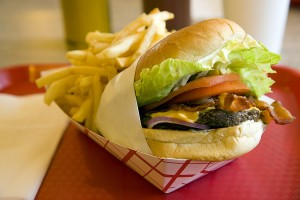Research shows that poor sleep leads people to choose less-healthy foods

Author: Jonathan Warren
People who have not had a good night's sleep are more likely to feel urges to eat food that is high in calories the following day, a new study has revealed. The research, conducted by scientists at the University of California, found that people who had not slept well craved high-calorie food more than when they had had a good night's sleep.
In the study, scientists examined the brain activity of 23 participants after a good night's sleep, and again after they had slept poorly. They discovered that sleep deprivation reduced activity in the three areas of the brain that help to process odour and flavour signals. They also found that poor sleep caused more activity in the amygdala - the part of the brain that produces the motivation to eat. The researchers then asked participants to rate pictures of high-calorie foods, and found that they ranked them as being more appealing after poor sleep than after good rest.
Whilst the body does need more energy if it is awake for longer, the high-calorie foods that people crave after poor sleep more than meet this need, says Stephanie Greer, a member of the research team that conducted the study. She pointed out that the changes in food desirability seen in the sleep-deprived brain may originally have been an important survival technique, but are now maladaptive and detrimental to health.
Commenting on the significance of the research, Greer stated: "These findings provide opportunities to adjust our environment and behaviour in new ways to combat such health issues […] specifically, our study indicates that one choice people can make is to regularly obtain sufficient amounts of sleep."
 Research shows that poor sleep leads people to choose less-healthy foods
Research shows that poor sleep leads people to choose less-healthy foods
 Research shows that poor sleep leads people to choose less-healthy foods
Research shows that poor sleep leads people to choose less-healthy foods

